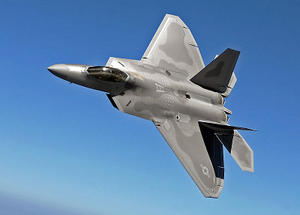IranU.S. bolsters its military capabilities in the Gulf
The United States has bolstered its military capabilities in the Gulf by stationing six stealth F-22 Raptors at the al Dafra air base, 150 miles from Iran. The F-22 is the most advanced plane in the U.S. arsenal – and also the most expensive, at about $150 million a plane. The F-22 can carry eight smart bombs which it can simultaneously direct at four different targets on the ground – and do so at supersonic speed while evading enemy’s radar.

F-22 Raptor in flight // Source: commons.wikimedia.com
The United States has bolstered its military capabilities in the Gulf by stationing six stealth F-22 Raptors at the al Dafra air base, 150 miles from Iran. The F-22 is the most advanced plane in the U.S. arsenal – and also the most expensive, at about $150 million a plane.
The Pentagon initially was planning on purchasing 750 Raptors, but the cost proved prohibitive and only 187 were purchased. The production of the F-22 was halted in 2011.
The F-22 can carry eight smart bombs which it can simultaneously direct at four different targets on the ground – and do so at supersonic speed while evading enemy’s radar.
It is not uncommon for the F-22 to be stationed at bases around the world for a short period, and then come back home. It now appears that the six F-22 at al Dafra are more or less permanently there: when the six Raptors from Holloman Air Force Base in New Mexico were flown back home, they were replaced by six Raptors from Elemndorf-Richardson Air Force Base in Alaska.
The Israeli defense minister Ehud Barak was at the economic summit at Davos last week, where he was interviewed by the Daily Beast.
In light of the presence of the F-22 in the Gulf, two paragraphs from the interview are especially intriguing:
“I don’t see it as a binary kind of situation: either they [the Iranians] turn nuclear or we have a fully fledged war the size of the Iraqi war or even the war in Afghanistan,” said Barak. “What we basically say is that if worse comes to worst, there should be a readiness and an ability to launch a surgical operation that will delay them by a significant time frame and probably convince them that it won’t work because the world is determined to block them.”
“We of course prefer that diplomacy will do,” said Barak, “We of course prefer that some morning we wake up and see that the Arab Spring was translated into Farsi and jumped over the Gulf to the streets of Tehran, but you cannot build a plan on it. And we should be able to do it.” That is, stage a surgical series of strikes.
Barak said he used to mock his American friends in the past. “I used to tell them, you know, when we are talking about surgical operations we think of a scalpel, you think of a chisel with a 10-pound hammer.” But that’s not the case with the Obama administration, Barak said. Under orders from the White House, he noted, “the Pentagon prepared quite sophisticated, fine, extremely fine, scalpels. So it is not an issue of a major war or a failure to block Iran. You could under a certain situation, if worse comes to worst, end up with a surgical operation.”
